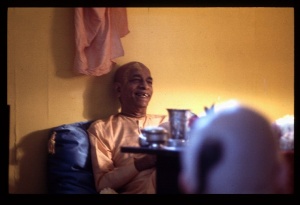SB 10.12.12

A.C. Bhaktivedanta Swami Prabhupada
TEXT 12
yat-pāda-pāṁsur bahu-janma-kṛcchrato
dhṛtātmabhir yogibhir apy alabhyaḥ
sa eva yad-dṛg-viṣayaḥ svayaṁ sthitaḥ
kiṁ varṇyate diṣṭam ato vrajaukasām
SYNONYMS
yat—whose; pāda-pāṁsuḥ—dust of the lotus feet; bahu-janma—in many births; kṛcchrataḥ—from undergoing severe austerities and penances as a way of practicing yoga, meditation, etc.; dhṛta-ātmabhiḥ—by persons able to control the mind; yogibhiḥ—by such yogīs (jñana-yogīs, rāja-yogīs, dhyāna-yogīs, etc.); api—indeed; alabhyaḥ—cannot be achieved; saḥ—the Supreme Personality of Godhead; eva—indeed; yat-dṛk-viṣayaḥ—has become the object of direct vision, face to face; svayam—personally; sthitaḥ—present in front of them; kim—what; varṇyate—can be described; diṣṭam—about the fortune; ataḥ—therefore; vraja-okasām—of the inhabitants of Vrajabhūmi, Vṛndāvana.
TRANSLATION
Yogīs may undergo severe austerities and penances for many births by practicing yama, niyama, āsana and prāṇāyāma, none of which are easily performed. Yet in due course of time, when these yogīs attain the perfection of controlling the mind, they will still be unable to taste even a particle of dust from the lotus feet of the Supreme Personality of Godhead. What then can we describe about the great fortune of the inhabitants of Vrajabhūmi, Vṛndāvana, with whom the Supreme Personality of Godhead personally lived and who saw the Lord face to face?
PURPORT
We can simply imagine the great fortune of the inhabitants of Vṛndāvana. It is impossible to describe how, after many, many births of pious activities, they have become so fortunate.